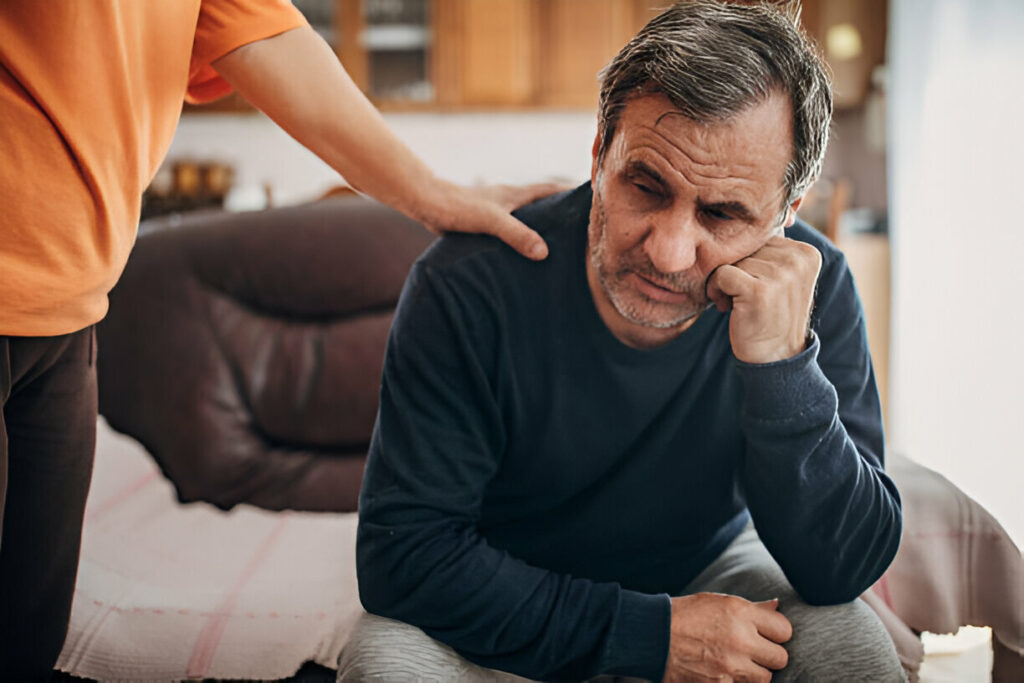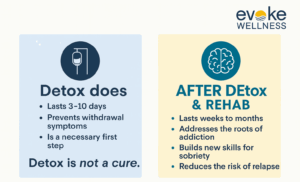Even when your loved one takes the brave step into an alcohol detox center, your heart might be in two places at once—hopeful and guarded. You’ve seen them suffer, you’ve seen them try, and you may have seen them fall back into old patterns before. You want this to be the turning point. But you’re also quietly wondering: Will this finally fix it?
As a clinician who works closely with families in San Marcos, I want to answer that question honestly—while also giving you reason to hold onto hope. Detox is important. It’s necessary. But it’s not the whole story.
Does Detox “Cure” Alcohol Addiction?
No. Detox is not a cure for alcohol addiction—it’s the starting line.
Detox is a medical process that helps a person safely withdraw from alcohol under supervision. It clears the alcohol from their system, stabilizes their body, and reduces the physical danger of withdrawal symptoms, which can be severe or even life-threatening.
But addiction isn’t just about alcohol in the bloodstream. It’s also about the brain’s relationship with alcohol, the habits and routines that make drinking part of daily life, and the emotional wounds that alcohol may be covering up. Detox doesn’t erase those patterns.
Think of it this way: If addiction is like a house fire, detox puts out the flames. But rebuilding the house—the structure, the safety, the sense of home—takes more time and work.
Why Is Detox Still So Important?
Some families wonder if detox is worth it if it doesn’t “cure” the problem. The answer is yes, because without it, your loved one may not survive the withdrawal process.
Alcohol withdrawal can cause symptoms like anxiety, tremors, sweating, nausea, and insomnia. In more severe cases, it can lead to seizures, hallucinations, or a dangerous condition called delirium tremens (DTs). These symptoms are not just uncomfortable—they can be fatal if untreated.
Detox ensures your loved one goes through withdrawal safely, with medical care to manage symptoms and prevent complications. It also gives them a clearer mind and a more stable body, making it possible to focus on the deeper work of recovery.
One family member told me, “When she came out of detox, I could finally see her eyes again—not just the pain in them, but the person.”
What Happens After Detox?
This is where many families get caught off guard. The detox center may discharge your loved one in a matter of days, but recovery is a much longer road.
Ideally, they should move directly into a structured treatment program—such as inpatient rehab, partial hospitalization, or intensive outpatient care. These programs provide:
- Therapy to address root causes like trauma, stress, or mental health disorders
- Skills training to handle cravings and avoid high-risk situations
- Support groups for connection and accountability
- Family counseling to rebuild trust and set healthy boundaries
In San Marcos, our team at Evoke Wellness Texas works with clients to create a treatment plan before detox ends, so there’s no gap in care where relapse could slip in.
Can Someone Stay Sober Without Further Treatment?
It’s possible, but rare—and it often depends on the level of addiction and the support available afterward.
Without continued care, relapse rates after detox are high. That’s not because people don’t want to stay sober—it’s because detox only addresses the physical dependence. Without learning how to manage stress, navigate triggers, and find healthy replacements for drinking, old habits can feel like the only option.
Continuing treatment after detox greatly increases the odds of long-term recovery. It’s like getting a cast removed after a broken leg—you still need physical therapy to walk without pain or injury.
What’s the Difference Between Detox and Rehab?
This is a common point of confusion:
| Detox | Rehab |
|---|---|
| Usually lasts 3–10 days | Can last weeks to months |
| Focuses on medical withdrawal | Focuses on emotional, behavioral, and psychological recovery |
| Removes alcohol from the body | Builds new coping strategies and lifestyle changes |
| Necessary first step for safety | Necessary for long-term recovery success |
Both are important, but they serve very different purposes.
How Can I Support My Loved One After Detox?
Your role after detox matters more than you might realize. You can’t do the work for them, but you can create conditions that make recovery more likely.
Here are a few ways:
- Encourage ongoing treatment—help them connect to a rehab program as soon as possible
- Stay consistent with boundaries—love doesn’t mean rescuing them from the consequences of drinking
- Offer practical help—rides to therapy, support with daily tasks, or simply listening without judgment
- Care for yourself too—your stability is part of their support system
A spouse in one of our support groups put it perfectly: “I learned I could love him and still let him carry his own bags.” That balance—love without over-rescue—helps both partners heal.
What If They Don’t Want to Continue Treatment?
This can be one of the most heartbreaking moments for a partner or spouse. You’ve seen them survive detox, and you know they’re vulnerable to relapse. But they may feel “done” or think they can handle it on their own.
In this case:
- Share your concerns without ultimatums—“I’m scared for you” goes further than “You’ll relapse if you don’t go.”
- Offer information, not pressure—Give them brochures, websites, or phone numbers so the option is always open.
- Protect your own mental health—If they choose not to continue, you may need extra support through therapy or groups like Al-Anon.
Can Relapse Still Happen After Detox and Treatment?
Yes—and it doesn’t mean treatment failed. Addiction is a chronic condition, and relapse can be part of the process for some people.
If relapse happens:
- Encourage them to return to treatment quickly—waiting often makes it harder to restart
- Avoid shame-based conversations—relapse is a sign they need more or different support, not proof they’re hopeless
- Keep your boundaries intact—love and enablement are not the same thing
What Makes Evoke Wellness Texas Different for Detox and Beyond?
At Evoke Wellness Texas in San Marcos, we see detox as the gateway, not the goal. We provide:
- 24/7 medical supervision for safety during withdrawal
- Comfort-focused care so clients can focus on recovery, not just survival
- Immediate transition planning into rehab programs that fit their needs
- Family education and support so you’re prepared for what’s next
We also know that recovery isn’t just about not drinking—it’s about building a life where alcohol isn’t needed to cope, connect, or celebrate.
Call (888)450-2285 or visit our alcohol detox center services in San Marcos, Texas to learn more about your options and next steps.



